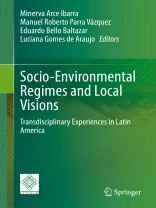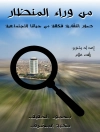This book presents oral histories, collective dialogues, and analyses of rural and indigenous livelihoods facing global socio-environmental regime change in Latin America (LA). Since the late twentieth century, rural and indigenous producers in LA, including agriculturists, coffee-growers, as well as small-scale farmers/fishers, and others, have had to resist, cope with, or adapt to a range of neoliberal socio-environmental regimes that impact their territories and associated resources, including water, production systems and ultimately their cultural traditions. In response, rural producers are using local visions and innovation niches to decide what, when, and how to resist, cope with uncertainty, and still be successful in using their customary laws to retain their land rights and livelihoods.
This book presents a range of ethnically diverse case studies from LA, which addresses socio-environmental, educational, and law regimes’ effects usingtransdisciplinary research approaches in rural, traditional and indigenous production systems. Based on both, the results and insights gained into how producers are resisting and adapting to these regimes, as well as decades of research carried out in LA rural territories by the participating authors, the book puts forward a baseline for devising new public policies that are better suited to the real challenges of livelihoods, poverty, and environmental degradation in LA. These recommendations are rooted in post-development thinking; they promote territorial public policy with social inclusion and a human’s rights approach.
The book draws on over 20 years of research carried out by LA’s academics and their undergraduate and graduate students who have addressed collaborative work, participatory research, and transdisciplinary approaches with rural commons and communities in LA. It features 19 case studies, with contributions from Argentina, Bolivia, Brazil, Colombia, Cuba, Honduras, and Mexico.
विषयसूची
Part I – INTRODUCTION AND THEORETICAL POSITIONING.- Chapter 1 – What do we mean by socio-environmental regimes, local visions, and transdisciplinary approaches?.- Part II – AT THE INTERSECTION OF DIFFERENT SOURCES OF KNOWLEDGE.- Chapter 2 – Traditional knowledge in the Colombian Amazon: Between indigenous territorial autonomy and environmental governance.- Chapter 3 – Education in Maya macehual institutions.- Chapter 4 – Ngô ndêt pá khre: environmental governance challenges in the springs of Xingu River, Central Brazil.- Chapter 5 – The niche and transdisciplinarity of coffee growing families and their social organizations.- Part III – THE DIFFERENT ROLES OF NATURAL PROTECTED AREAS.- Chapter 6 – Trindade and the struggle for its territory: A trajectory of empowerment and community self-governance in southeastern coast of Brazil.- Chapter 7 – Development policy and its impacts on Brazilian sociobiodiversity: The case of the traditional communities of Canastra, Brazil.- Chapter 8 – Environmental citizenship and emancipatory partnership: struggles for a sea-land territory in Brazil.- Chapter 9 – Interculturalism and power at the margin of environmental governance. An approach from the Selva el Ocote Biosphere Reserve.- Part IV – WHENEVER CULTURE AND TRADITIONS MATTER.- Chapter 10 – Maya rainforest under the restrictive power of Law (Quintana Roo, Mexico).- Chapter 11 – Interactions between traditional Maya agriculture and the global agro-food regime.- Chapter 12 – Ecotourism and social differentiation in communities from the Maya area, Mexico.- Chapter 13 – Diet transformation in Maya domestic groups from Mexico.- Chapter 14 – Climatic variability and its effects upon Maya Zone livelihoods in Quintana Roo, Mexico.- Part V – FROM CLASHES TO AGREEMENTS: HOW TO GET THERE?.- Chapter 15 – Effects of public agriculture and livestock policies on Indigenous communities’ livelihood systems in the Amazon and El Chaco, Bolivia.- Chapter 16 – Convergence of domination between territory and food regimes: Valle Inferior’s case study of the Negro river (Province of Río Negro, Argentina).- Chapter 17 – Disagreement between campesino strategies and the agro-food regime: Case study of La Sepultura Biosphere Reserve, Chiapas.- Chapter 18 – Disagreement between campesino strategies and the agro-food regime: Case study of La Sepultura Biosphere Reserve, Chiapas.- Chapter 19 – Agroecology and smallholder farmers/rural communities in Brazil.- Chapter 20 – From land degradation to community conservation and social valuation of rural livelihoods: Lessons from São Luiz do Paraitinga, Brazil.- Chapter 21 – Inter-institutional places for agreement as a baseline of food and diet security: Case study of the Mesa SAN of Nacaome, Honduras.- Chapter 22 – Social learning among rural small ruminant producers: A vision from Granma, Cuba.- Part VI – SYNTHESIS AND MOVING FORWARD.- Chapter 23 – Lessons learned and informed advice.
लेखक के बारे में
Dr. Arce Ibarra has been a Researcher at El Colegio de la Frontera Sur (ECOSUR) in Mexico since 1996. Initially trained as a fisheries biologist, her current research interests have expanded to include the commons and community-based conservation, small-scale fisheries, valuation of the environment (including ecological economics) and transdisciplinary approaches to the viability and sustainability of small-scale production systems. Dr. Ibarra holds a Ph.D. in Interdisciplinary studies from Dalhousie University. She was a member of the FAO-WECAFC spiny lobster Working Group and part of the Steering Committee for the United Nations Development Program COMPACT (Maya communities-Sian Ka’an). She is currently involved with the Community Conservation Research Network and Too Big To Ignore: Global Partnerships for Small Scale Fisheries.
Dr. Parra Vázquez has been a Researcher at ECOSUR since 1982. Trained as an agricultural engineer, he holds a Master’s degree in agricultural sciences and a Ph.D. in Economics. His main research interest is in interwoven problems of conservation and development in peasant communities, and addressing these problems from the perspective of participatory action research. His research approach encompasses several aspects of analysis, notably the family, community, territorial, and regional scales. He is a member of ECOSUR’s Research Group for coffee-growing areas in Mexico.
Dr. Bello Baltazar has been a Researcher/Scientist at ECOSUR, Mexico since 1997. Trained as an agronomist, he also holds a Ph.D. in Social Anthropology. Currently, his research interests include: socio-environmental processes of conservation, local territory and territorialities, family and community-based ecotourism, and transdisciplinary approaches addressing the viability and sustainability of small-scale production systems. From 2009 to 2012, he led a transdisciplinary project and a collaboration network on socio-environmental innovation in southern Mexico.
Dr. Araujo’s background is in Ecology (Master’s degree from the University of Campinas, 2007) and she holds a Ph.D. in Environment and Society (2014). She chiefly works as a researcher in the field of management and conservation of natural commons, and as a facilitator of participatory and social processes related to community-based conservation and local development initiatives. She currently holds a research position in the project Unlocking Economic Opportunities to Scale Forest and Landscape Restoration in Brazil, and is a member of Commons Conservation and Management Research.












